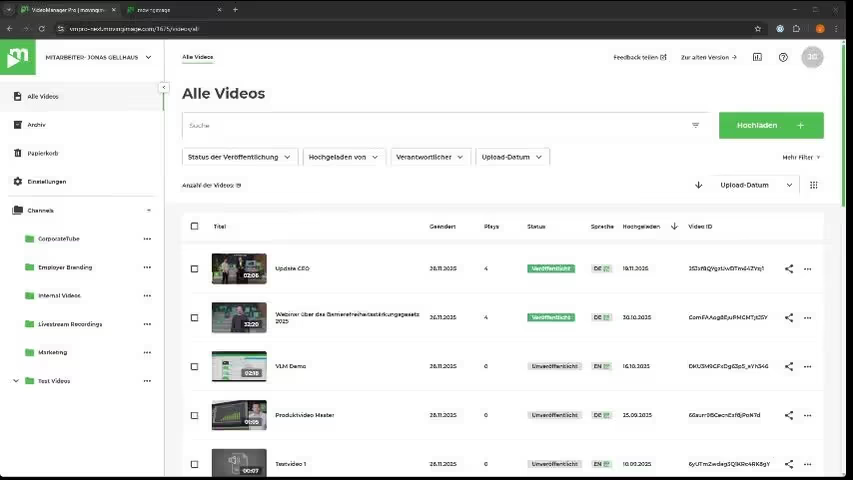The 5 best platforms for hybrid events [Guide]

Driving your success with video

The 5 best platforms for hybrid events [Guide]
The concept of “hybrid” is nothing new. From cars and plants to working models—and now events—“hybrid” stands for the combination of two or more different technologies or approaches. But what does that mean for the future of the event industry? What role do hybrid event platforms play? And how can organizers find the right platform for their specific needs?
In this guide, we’ll explore how hybrid event formats are impacting the events industry, define the key features of a hybrid event platform, and wrap up with a comparison of the top hybrid event platforms in 2022.
Definition: What is a hybrid event?
Hybrid events are a mix of physical events (held at a real-world venue) and virtual events (hosted online via the internet).
For many organizers, combining both formats is the ideal way to maximize the number of participants while also creating opportunities for interaction and networking.
Great examples of successful hybrid events include Apple’s pre-pandemic keynotes. Selected journalists from around the world were invited to attend in person and test the new devices on-site, while the event was simultaneously streamed live to millions of viewers around the globe.
Hybrid events with more "remote interaction" include formats like hybrid town hall meetings, annual general meetings, or university lectures, where virtual participants are actively involved in the proceedings. Many event platforms support this with additional features such as live chats, polls, or video participation.
Advantages of hybrid event software
Wider reach
While the number of attendees at a physical event is limited by the size of the venue, virtual events have no such constraints. Hybrid and virtual formats are especially appealing to people who can’t or prefer not to attend in person.
Higher engagement
Thanks to the interactive features of many event platforms, in-person and virtual participants can connect just as they would face to face. Smart matchmaking features help participants identify the right conversation partners and network effectively—even remotely. Digital environments also support tools like chats, polls, or breakout rooms to encourage interaction.
Better cost control
Virtual and hybrid formats offer more flexibility in financial planning. If some or all of the audience attends virtually, a smaller venue may be sufficient. At the same time, the total number of participants (and therefore ticket revenue) can be maximized without significantly increasing costs for catering, travel, or accommodations.
New insights
Good hybrid event software provides organizers with valuable insights into audience engagement and participation. These insights can be used to analyze the event, better understand participant behavior, and improve the planning of future events.
Hybrid event platforms: which features matter?
The virtual event solutions market has grown rapidly since 2020. But only a few providers offer platforms that truly meet the needs of today’s event professionals. This list outlines the key features to look for when choosing the best hybrid event platform.
Ease of use
Event software should be intuitive and require minimal prior knowledge—for both organizers and participants. A poor user experience leads to dissatisfied attendees, low engagement, and high drop-off rates.
Customizable design & features
There are many types of events, each with its own requirements. A strong hybrid event platform allows customization of both design and functionality. A good solution should work equally well for a small, private workshop and for a large conference with tens of thousands of participants.
Data privacy and security
As an event organizer, you are responsible for protecting your participants’ personal data—especially if your organization is subject to GDPR. A reliable hybrid platform is transparent about what data is collected and how it is processed. It’s also important to know where the data is stored (e.g., server location). Features like encryption and password protection are essential.
Interactive features
One of the biggest challenges of virtual and hybrid events is keeping participants actively engaged, especially over longer periods. Polls, chats, and gamification tools help draw participants into the experience and turn your hybrid event into an interactive one.
Integrated networking
Networking is often one of the most exciting aspects of an event. In a hybrid or virtual context, it’s essential that both in-person and remote participants can network freely. A hybrid solution should include smart matchmaking features that connect people based on similar interests or profiles. Breakout rooms and private chats are also must-haves to facilitate meaningful conversations.
Software and system integrations
A hybrid or virtual event platform should not only be extendable with third-party tools, but also integrate easily into your company’s existing systems and workflows. This interoperability is key to embedding your event seamlessly into your broader marketing and communication strategy.
Comparison: the best hybrid event platforms of 2022
1. movingimage Virtual Events
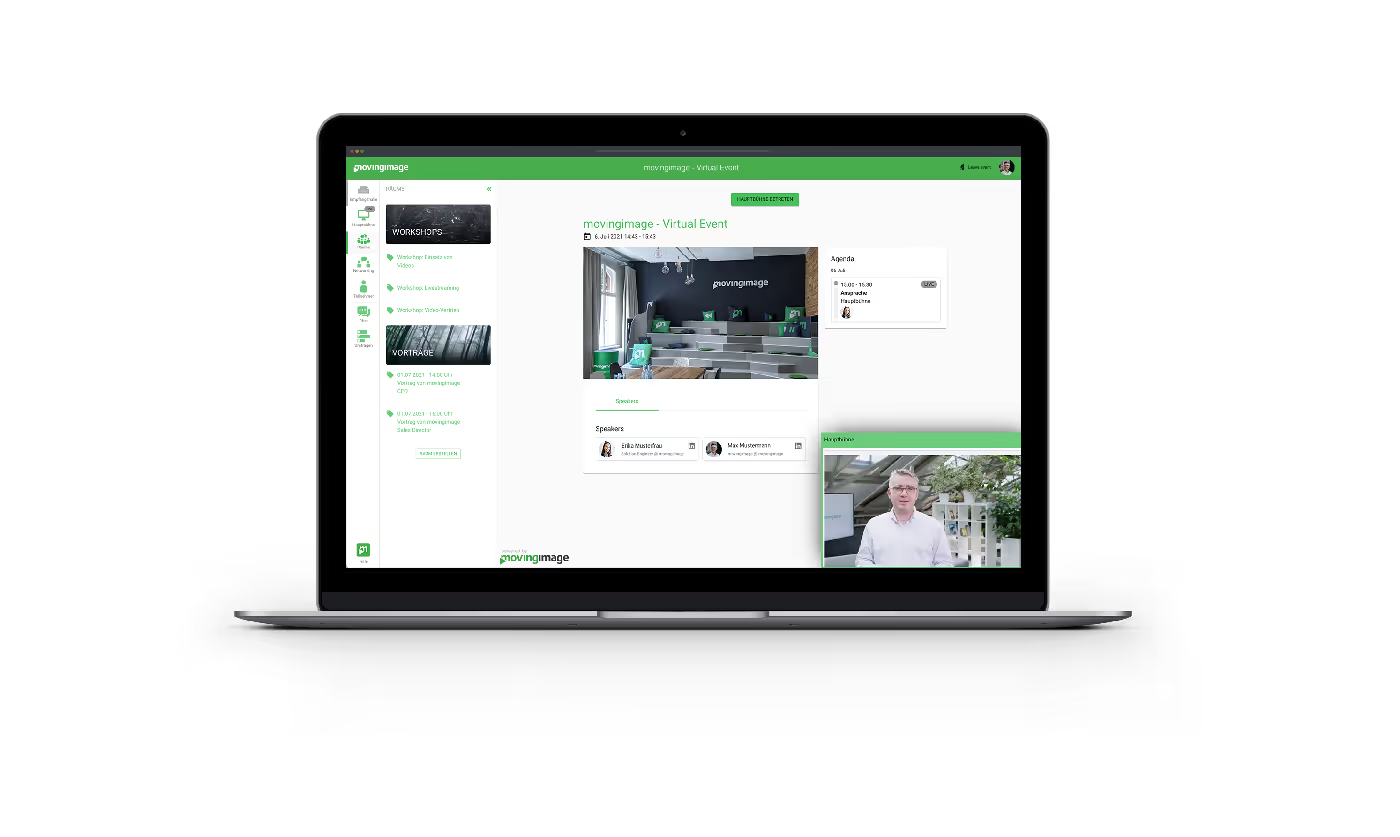
With our all-in-one platform for virtual and hybrid events, you can host personalized, interactive, and secure events of any size.
The platform is easy to use and comes with a variety of built-in features to support you from planning through to execution. You can create a customized registration page and send invitations and reminders directly from the platform.
Your participants can easily interact with you and with each other. In addition to chat and polling features, you can create separate rooms—ideal for workshops, networking, or breakout sessions.
You can also integrate third-party tools, external streaming and video conferencing solutions, or even entire websites into your event to achieve the highest level of personalization. Especially for hybrid events, this ensures smooth interaction between onsite and virtual participants.
The event analytics dashboard provides valuable insights and reports about your hybrid event.
Virtual Events is especially suited for: all-hands meetings and team events, annual general meetings and investor relations events, conferences, talks, trade shows, interactive product demos, and video shopping.
2. Hopin
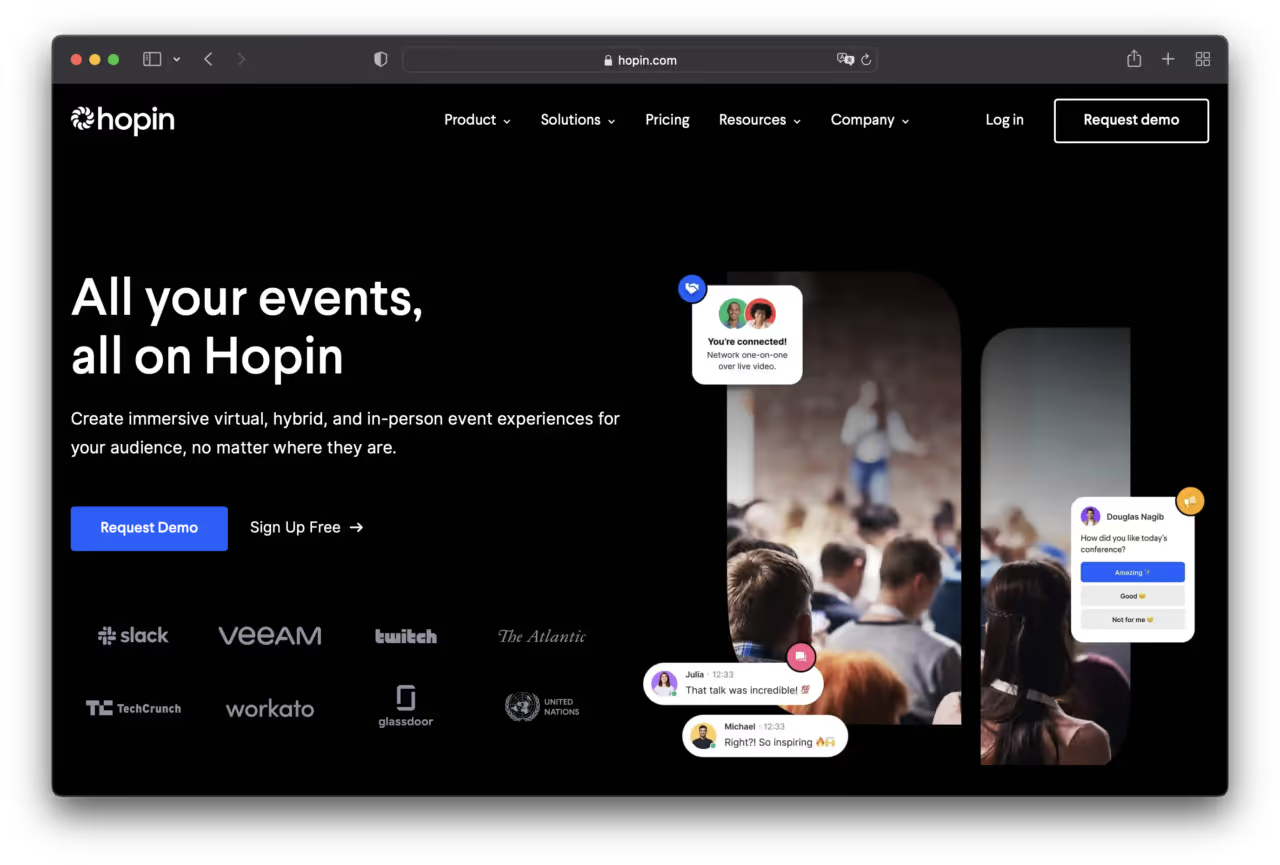
Hopin is a virtual all-in-one event platform designed to support customizable hybrid events for audiences of all sizes. As one of the bigger names in the market, Hopin excels at what it does best.
The strength of in-person events is networking—and Hopin does a great job replicating that experience. You can use Hopin to host virtual conferences and fully customize the platform with your branding.
Hopin’s breakout sessions enable personal interactions, creating an experience that feels similar to a Zoom or Microsoft Teams meeting. The platform is also extendable via integration with other tools and platforms.
It includes an analytics dashboard and detailed reports that provide insights into the performance of your hybrid events.
3. Hubilo

Hubilo enables companies to scale their hybrid events and increase returns for stakeholders. The platform focuses equally on the experience of both guests and sponsors.
Attendees can earn points by joining sessions, visiting exhibitor booths, and sending messages to other participants—boosting engagement through gamification. These points help users climb a leaderboard, qualifying them for event giveaways. Not only is this fun for guests, but it also makes it easier for organizers to attract exhibitors and sponsors for future events.
4. Converve
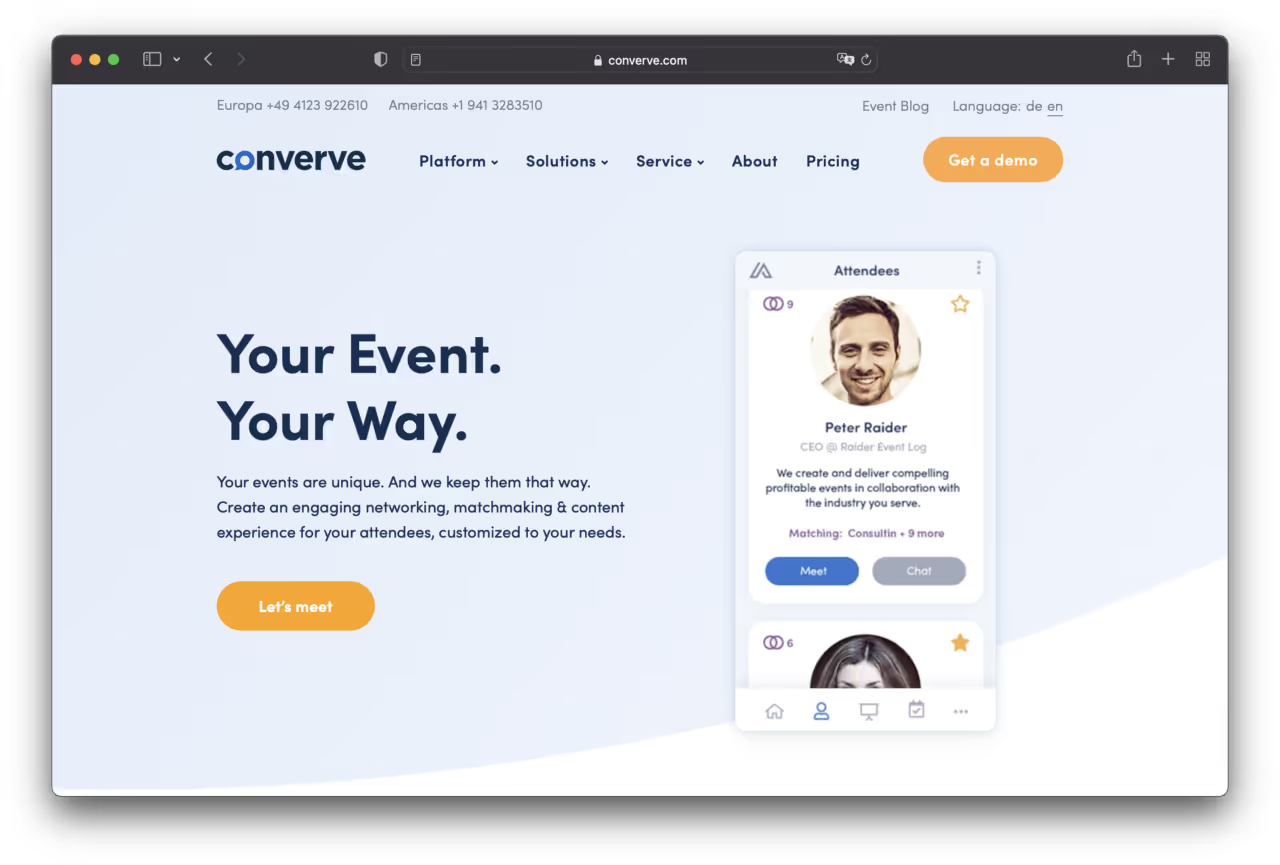
Converve is an event software provider specializing in B2B matchmaking and networking. With this platform, you can create custom event websites, set up registration pages and participation fees, and leverage analytics features. Currently, you can connect over 1,500 apps to Converve and easily import data from your CRM to generate more precise insights. Its standout feature is the platform’s strong focus on networking.
Users can build participant databases and receive algorithm-based suggestions for matches based on recent interactions—helping foster a dynamic networking community. Participants can also customize their agendas, schedule meetings with others, and send direct messages.
5. Webex Events
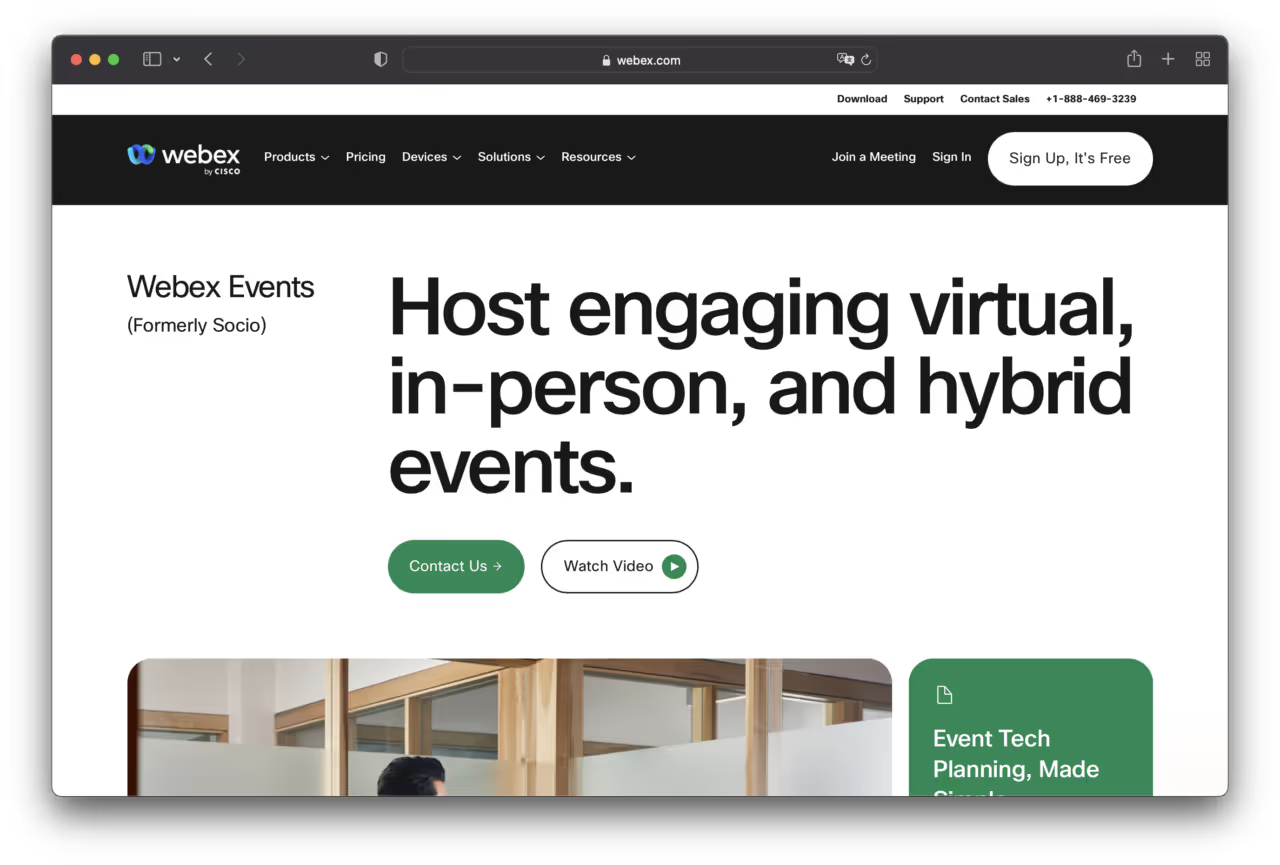
The Webex event management platform helps you organize and host in-person, hybrid, and virtual events. It handles everything from registrations and lead capture to real-time analytics and online meetings—all within one platform.
This hybrid event platform also offers customizable branding options. You can tailor the registration process and offer various ticket types and discount codes.
In addition, you can store participant data within the platform, send out personalized meeting invitations via email, and create and use custom forms.
Conclusion
At the start of the COVID-19 pandemic, event participants had little choice but to accept virtual and hybrid events—many of which were far from perfect. Today, expectations are much higher. Especially for hybrid events, organizers must offer strong value and an exceptional experience to win over their audiences.
When comparing hybrid event platforms, you should therefore look beyond just the price. The key factors to consider are feature sets, scalability, customization options, security—and of course, customer support. If possible, test several platforms before making your final decision.
Our Speakers
The concept of “hybrid” is nothing new. From cars and plants to working models—and now events—“hybrid” stands for the combination of two or more different technologies or approaches. But what does that mean for the future of the event industry? What role do hybrid event platforms play? And how can organizers find the right platform for their specific needs?
In this guide, we’ll explore how hybrid event formats are impacting the events industry, define the key features of a hybrid event platform, and wrap up with a comparison of the top hybrid event platforms in 2022.
Definition: What is a hybrid event?
Hybrid events are a mix of physical events (held at a real-world venue) and virtual events (hosted online via the internet).
For many organizers, combining both formats is the ideal way to maximize the number of participants while also creating opportunities for interaction and networking.
Great examples of successful hybrid events include Apple’s pre-pandemic keynotes. Selected journalists from around the world were invited to attend in person and test the new devices on-site, while the event was simultaneously streamed live to millions of viewers around the globe.
Hybrid events with more "remote interaction" include formats like hybrid town hall meetings, annual general meetings, or university lectures, where virtual participants are actively involved in the proceedings. Many event platforms support this with additional features such as live chats, polls, or video participation.
Advantages of hybrid event software
Wider reach
While the number of attendees at a physical event is limited by the size of the venue, virtual events have no such constraints. Hybrid and virtual formats are especially appealing to people who can’t or prefer not to attend in person.
Higher engagement
Thanks to the interactive features of many event platforms, in-person and virtual participants can connect just as they would face to face. Smart matchmaking features help participants identify the right conversation partners and network effectively—even remotely. Digital environments also support tools like chats, polls, or breakout rooms to encourage interaction.
Better cost control
Virtual and hybrid formats offer more flexibility in financial planning. If some or all of the audience attends virtually, a smaller venue may be sufficient. At the same time, the total number of participants (and therefore ticket revenue) can be maximized without significantly increasing costs for catering, travel, or accommodations.
New insights
Good hybrid event software provides organizers with valuable insights into audience engagement and participation. These insights can be used to analyze the event, better understand participant behavior, and improve the planning of future events.
Hybrid event platforms: which features matter?
The virtual event solutions market has grown rapidly since 2020. But only a few providers offer platforms that truly meet the needs of today’s event professionals. This list outlines the key features to look for when choosing the best hybrid event platform.
Ease of use
Event software should be intuitive and require minimal prior knowledge—for both organizers and participants. A poor user experience leads to dissatisfied attendees, low engagement, and high drop-off rates.
Customizable design & features
There are many types of events, each with its own requirements. A strong hybrid event platform allows customization of both design and functionality. A good solution should work equally well for a small, private workshop and for a large conference with tens of thousands of participants.
Data privacy and security
As an event organizer, you are responsible for protecting your participants’ personal data—especially if your organization is subject to GDPR. A reliable hybrid platform is transparent about what data is collected and how it is processed. It’s also important to know where the data is stored (e.g., server location). Features like encryption and password protection are essential.
Interactive features
One of the biggest challenges of virtual and hybrid events is keeping participants actively engaged, especially over longer periods. Polls, chats, and gamification tools help draw participants into the experience and turn your hybrid event into an interactive one.
Integrated networking
Networking is often one of the most exciting aspects of an event. In a hybrid or virtual context, it’s essential that both in-person and remote participants can network freely. A hybrid solution should include smart matchmaking features that connect people based on similar interests or profiles. Breakout rooms and private chats are also must-haves to facilitate meaningful conversations.
Software and system integrations
A hybrid or virtual event platform should not only be extendable with third-party tools, but also integrate easily into your company’s existing systems and workflows. This interoperability is key to embedding your event seamlessly into your broader marketing and communication strategy.
Comparison: the best hybrid event platforms of 2022
1. movingimage Virtual Events

With our all-in-one platform for virtual and hybrid events, you can host personalized, interactive, and secure events of any size.
The platform is easy to use and comes with a variety of built-in features to support you from planning through to execution. You can create a customized registration page and send invitations and reminders directly from the platform.
Your participants can easily interact with you and with each other. In addition to chat and polling features, you can create separate rooms—ideal for workshops, networking, or breakout sessions.
You can also integrate third-party tools, external streaming and video conferencing solutions, or even entire websites into your event to achieve the highest level of personalization. Especially for hybrid events, this ensures smooth interaction between onsite and virtual participants.
The event analytics dashboard provides valuable insights and reports about your hybrid event.
Virtual Events is especially suited for: all-hands meetings and team events, annual general meetings and investor relations events, conferences, talks, trade shows, interactive product demos, and video shopping.
2. Hopin

Hopin is a virtual all-in-one event platform designed to support customizable hybrid events for audiences of all sizes. As one of the bigger names in the market, Hopin excels at what it does best.
The strength of in-person events is networking—and Hopin does a great job replicating that experience. You can use Hopin to host virtual conferences and fully customize the platform with your branding.
Hopin’s breakout sessions enable personal interactions, creating an experience that feels similar to a Zoom or Microsoft Teams meeting. The platform is also extendable via integration with other tools and platforms.
It includes an analytics dashboard and detailed reports that provide insights into the performance of your hybrid events.
3. Hubilo

Hubilo enables companies to scale their hybrid events and increase returns for stakeholders. The platform focuses equally on the experience of both guests and sponsors.
Attendees can earn points by joining sessions, visiting exhibitor booths, and sending messages to other participants—boosting engagement through gamification. These points help users climb a leaderboard, qualifying them for event giveaways. Not only is this fun for guests, but it also makes it easier for organizers to attract exhibitors and sponsors for future events.
4. Converve

Converve is an event software provider specializing in B2B matchmaking and networking. With this platform, you can create custom event websites, set up registration pages and participation fees, and leverage analytics features. Currently, you can connect over 1,500 apps to Converve and easily import data from your CRM to generate more precise insights. Its standout feature is the platform’s strong focus on networking.
Users can build participant databases and receive algorithm-based suggestions for matches based on recent interactions—helping foster a dynamic networking community. Participants can also customize their agendas, schedule meetings with others, and send direct messages.
5. Webex Events

The Webex event management platform helps you organize and host in-person, hybrid, and virtual events. It handles everything from registrations and lead capture to real-time analytics and online meetings—all within one platform.
This hybrid event platform also offers customizable branding options. You can tailor the registration process and offer various ticket types and discount codes.
In addition, you can store participant data within the platform, send out personalized meeting invitations via email, and create and use custom forms.
Conclusion
At the start of the COVID-19 pandemic, event participants had little choice but to accept virtual and hybrid events—many of which were far from perfect. Today, expectations are much higher. Especially for hybrid events, organizers must offer strong value and an exceptional experience to win over their audiences.
When comparing hybrid event platforms, you should therefore look beyond just the price. The key factors to consider are feature sets, scalability, customization options, security—and of course, customer support. If possible, test several platforms before making your final decision.



.avif)


.avif)






.avif)





